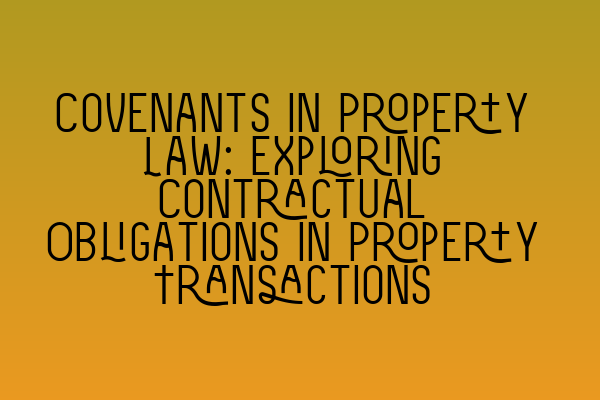Covenants in Property Law: Exploring Contractual Obligations in Property Transactions
When it comes to property law, one crucial aspect that both buyers and sellers need to understand is the concept of covenants. Covenants are contractual obligations that are binding upon the parties involved in a property transaction. They dictate certain rights, duties, and restrictions, protecting the interests of both the buyer and the seller.
In this article, we will delve into the world of covenants in property law, exploring their importance and impact on property transactions. So, whether you are a first-time homebuyer, a property investor, or a legal professional, this article will provide valuable insights into this essential aspect of property law.
Understanding Covenants
A covenant, in the context of property law, is a promise made by one party (the covenantor) to another party (the covenantee) that certain actions will be taken or refrained from in relation to the property being transferred. These promises are typically included in the contract or deed governing the property transaction.
The purpose of covenants is to regulate the use, enjoyment, and management of the property and ensure that the interests of all parties involved are protected. Covenants can cover a broad range of issues, including restrictions on land use, maintenance obligations, and rights of access.
Types of Covenants
There are two main types of covenants in property law:
- Positive Covenants: Positive covenants impose obligations on the landowner to perform certain actions. For example, a positive covenant may require the landowner to maintain the property or pay certain fees or charges.
- Negative Covenants: Negative covenants, on the other hand, restrict the landowner from doing certain things. These covenants often serve to protect the value and character of a property or surrounding area. For instance, a negative covenant might prohibit the landowner from making significant alterations to the property.
Enforceability of Covenants
For a covenant to be enforceable, it must meet certain criteria:
- Intention: There must be a clear intention of the parties to create a legally enforceable covenant.
- Touch and Concern: The covenant must relate to the land being transferred and not be personal in nature.
- Privity of Estate: The covenant must be intended to bind the present and future owners of the property.
- Registration: Depending on the jurisdiction, certain covenants may need to be registered or recorded to be enforceable against subsequent owners of the property.
It is important to note that the enforceability of covenants can vary depending on the jurisdiction and the specific circumstances of the case. Consulting with a qualified property law solicitor is advisable to ensure compliance with local laws and regulations.
Implications of Covenants
The presence of covenants in a property transaction can have various implications for both the buyer and the seller. Some of the key implications to consider are:
- Restrictions on Use: Restrictive covenants can limit the use and development of the property. Buyers need to be aware of any restrictions that may impact their plans for the property.
- Maintenance Obligations: Positive covenants may impose maintenance obligations on the buyer, such as maintaining shared access roads or communal areas.
- Financial Considerations: Covenants may involve financial obligations, such as annual fees or contributions to a maintenance fund. Buyers should carefully evaluate the financial impact of these obligations.
- Future Obligations: Covenants can bind subsequent owners of the property, meaning that the obligations may continue even after the property is sold.
Understanding the implications of covenants is crucial for both buyers and sellers to make informed decisions and avoid any potential legal disputes in the future.
Seeking Legal Advice
Given the complexity and potential legal implications of covenants in property transactions, it is highly recommended that parties seek legal advice from a property law solicitor. An experienced solicitor can provide guidance on the enforceability of covenants, their implications, and any potential issues that may arise.
At SQE Property Law & Land Law, our team of expert solicitors specializes in property law and can assist you with all aspects of property transactions, including covenants. We are here to provide the legal support and guidance needed to ensure a smooth and successful property transaction.
If you have any questions or require legal advice regarding covenants or any other property law matter, please contact our experienced team. We are here to help.
Do you want to test your knowledge of property law before your upcoming SQE exams? Check out our SQE 2 Preparation Courses and SQE 1 Preparation Courses!
Interested in SQE practice exams and mock quizzes? Explore our SQE 1 Practice Exam Questions and SQE 1 Practice Mocks FLK1 FLK2!
For more information about the SRA SQE exam dates, visit our website: SRA SQE Exam Dates.
